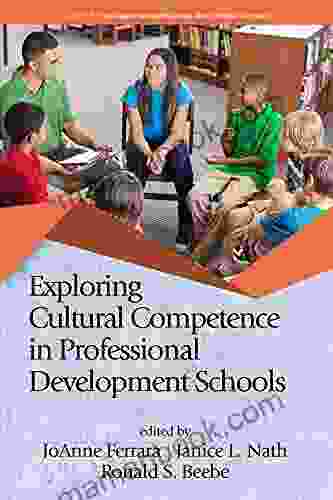Exploring Cultural Competence In Professional Development Schools: A Comprehensive Research Review

In today's diverse society, it is more important than ever for educators to be culturally competent. Cultural competence is the ability to effectively interact with people from different cultures. It involves understanding and respecting different cultural values, beliefs, and practices. Culturally competent educators are able to create inclusive learning environments that meet the needs of all students.
Professional development schools (PDSs) are a great place for educators to develop their cultural competence. PDSs are partnerships between schools and universities that provide opportunities for educators to learn from each other. They also provide opportunities for educators to work with students from different cultures.
4.5 out of 5
| Language | : | English |
| File size | : | 1644 KB |
| Text-to-Speech | : | Enabled |
| Screen Reader | : | Supported |
| Enhanced typesetting | : | Enabled |
| Word Wise | : | Enabled |
| Print length | : | 249 pages |
There is a growing body of research on cultural competence in PDSs. This research has shown that PDSs can be effective in helping educators develop their cultural competence. However, there is still much that we do not know about how to best develop cultural competence in PDSs.
This article provides a comprehensive review of the research on cultural competence in PDSs. The article begins by defining cultural competence and discussing its importance in education. The article then reviews the research on how PDSs can help educators develop their cultural competence. Finally, the article identifies areas for future research.
Defining Cultural Competence
Cultural competence is a complex concept that has been defined in many different ways. For the purposes of this article, we will use the definition provided by the National Association for the Education of Young Children (NAEYC). NAEYC defines cultural competence as "the ability to understand, appreciate, and interact with people from diverse cultures in a respectful and effective manner."
Cultural competence involves three key components:
- Awareness of one's own culture and how it influences one's beliefs and behaviors.
- Knowledge of other cultures and their values, beliefs, and practices.
- Skills for interacting with people from different cultures in a respectful and effective manner.
Culturally competent educators are able to:
- Recognize and respect the diversity of their students.
- Create inclusive learning environments that meet the needs of all students.
- Effectively communicate with students and families from different cultures.
- Collaborate with colleagues from different cultures to provide high-quality education for all students.
Importance of Cultural Competence in Education
Cultural competence is essential for educators in today's diverse society. Educators who are not culturally competent may inadvertently create barriers to learning for their students. They may also make decisions that are not in the best interests of their students.
Research has shown that cultural competence is associated with a number of positive outcomes for students. These outcomes include:
- Increased academic achievement.
- Improved social and emotional development.
- Reduced dropout rates.
- Increased college attendance rates.
Cultural competence is also important for educators themselves. Educators who are culturally competent are more likely to be satisfied with their jobs and have a positive impact on their students.
Developing Cultural Competence in PDSs
PDSs are a great place for educators to develop their cultural competence. PDSs provide opportunities for educators to:
- Learn from each other about different cultures.
- Work with students from different cultures.
- Reflect on their own cultural beliefs and practices.
There are a number of different ways that PDSs can help educators develop their cultural competence. These include:
- Providing professional development opportunities on cultural competence.
- Creating opportunities for educators to work with students from different cultures.
- Supporting educators in reflecting on their own cultural beliefs and practices.
- Encouraging collaboration between educators from different cultures.
Research has shown that PDSs can be effective in helping educators develop their cultural competence. However, there is still much that we do not know about how to best develop cultural competence in PDSs.
Areas for Future Research
There is a need for more research on cultural competence in PDSs. This research should focus on the following areas:
- The most effective ways to teach cultural competence in PDSs.
- The impact of PDSs on the cultural competence of educators.
- The role of PDSs in supporting educators in developing their cultural competence over time.
This research will help us to develop more effective ways to prepare educators to work with students from different cultures.
Cultural competence is essential for educators in today's diverse society. PDSs are a great place for educators to develop their cultural competence. However, there is still much that we do not know about how to best develop cultural competence in PDSs. More research is needed to help us develop more effective ways to prepare educators to work with students from different cultures.
References
- Banks, J. A. (2001). Cultural diversity and education: Foundations, curriculum, and teaching. Boston: Allyn & Bacon.
- Gay, G. (2002). Culturally responsive teaching: Theory, research, and practice. New York: Teachers College Press.
- Ladson-Billings, G. (1995). Toward a theory of culturally relevant pedagogy. American Educational Research Journal, 32(3),465-491.
- National Association for the Education of Young Children (NAEYC). (2009). Standards for professional development. Washington, DC: NAEYC.
- Villegas, A. M., & Lucas, T. (2002). Preparing culturally responsive teachers: Rethinking the curriculum. Journal of Teacher Education, 53(1),20-32.
4.5 out of 5
| Language | : | English |
| File size | : | 1644 KB |
| Text-to-Speech | : | Enabled |
| Screen Reader | : | Supported |
| Enhanced typesetting | : | Enabled |
| Word Wise | : | Enabled |
| Print length | : | 249 pages |
Do you want to contribute by writing guest posts on this blog?
Please contact us and send us a resume of previous articles that you have written.
 Top Book
Top Book Novel
Novel Fiction
Fiction Nonfiction
Nonfiction Literature
Literature Paperback
Paperback Hardcover
Hardcover E-book
E-book Audiobook
Audiobook Bestseller
Bestseller Classic
Classic Mystery
Mystery Thriller
Thriller Romance
Romance Fantasy
Fantasy Science Fiction
Science Fiction Biography
Biography Memoir
Memoir Autobiography
Autobiography Poetry
Poetry Drama
Drama Historical Fiction
Historical Fiction Self-help
Self-help Young Adult
Young Adult Childrens Books
Childrens Books Graphic Novel
Graphic Novel Anthology
Anthology Series
Series Encyclopedia
Encyclopedia Reference
Reference Guidebook
Guidebook Textbook
Textbook Workbook
Workbook Journal
Journal Diary
Diary Manuscript
Manuscript Folio
Folio Pulp Fiction
Pulp Fiction Short Stories
Short Stories Fairy Tales
Fairy Tales Fables
Fables Mythology
Mythology Philosophy
Philosophy Religion
Religion Spirituality
Spirituality Essays
Essays Critique
Critique Commentary
Commentary Glossary
Glossary Bibliography
Bibliography Index
Index Table of Contents
Table of Contents Preface
Preface Introduction
Introduction Foreword
Foreword Afterword
Afterword Appendices
Appendices Annotations
Annotations Footnotes
Footnotes Epilogue
Epilogue Prologue
Prologue J Sterling
J Sterling Sky Daniels
Sky Daniels James D Shipman
James D Shipman Mark David Abbott
Mark David Abbott Sarah M Cradit
Sarah M Cradit Milton Sanford Mayer
Milton Sanford Mayer Faith Blum
Faith Blum Paul A Craig
Paul A Craig Jeff Kass
Jeff Kass Armand Rosamilia
Armand Rosamilia Greg Stine
Greg Stine Jennifer Lees Marshment
Jennifer Lees Marshment Olivia Joy
Olivia Joy Danielle Duckery
Danielle Duckery Katarina
Katarina Lami Kamikaze
Lami Kamikaze Penny Simkin
Penny Simkin Mike Davis
Mike Davis Eracle Soldati
Eracle Soldati Janet Munsil
Janet Munsil
Light bulbAdvertise smarter! Our strategic ad space ensures maximum exposure. Reserve your spot today!
 Bryson HayesFollow ·13.1k
Bryson HayesFollow ·13.1k Sam CarterFollow ·4k
Sam CarterFollow ·4k George Bernard ShawFollow ·19.3k
George Bernard ShawFollow ·19.3k Chuck MitchellFollow ·11.9k
Chuck MitchellFollow ·11.9k Forrest BlairFollow ·4.6k
Forrest BlairFollow ·4.6k Bob CooperFollow ·17k
Bob CooperFollow ·17k Octavio PazFollow ·14.6k
Octavio PazFollow ·14.6k Victor TurnerFollow ·16.7k
Victor TurnerFollow ·16.7k

 Ernest Powell
Ernest PowellBenefits of Corporal Punishment: A Review of the...
Corporal punishment is a form of physical...

 Bobby Howard
Bobby HowardThe Development and Significance of African American...
African American...

 Guy Powell
Guy PowellDown Girl: The Logic of Misogyny - A Comprehensive...
In her groundbreaking work,...

 Forrest Blair
Forrest BlairThe Bikini Changing Room: A Micro Mini Romance
In the heart of...
4.5 out of 5
| Language | : | English |
| File size | : | 1644 KB |
| Text-to-Speech | : | Enabled |
| Screen Reader | : | Supported |
| Enhanced typesetting | : | Enabled |
| Word Wise | : | Enabled |
| Print length | : | 249 pages |
















